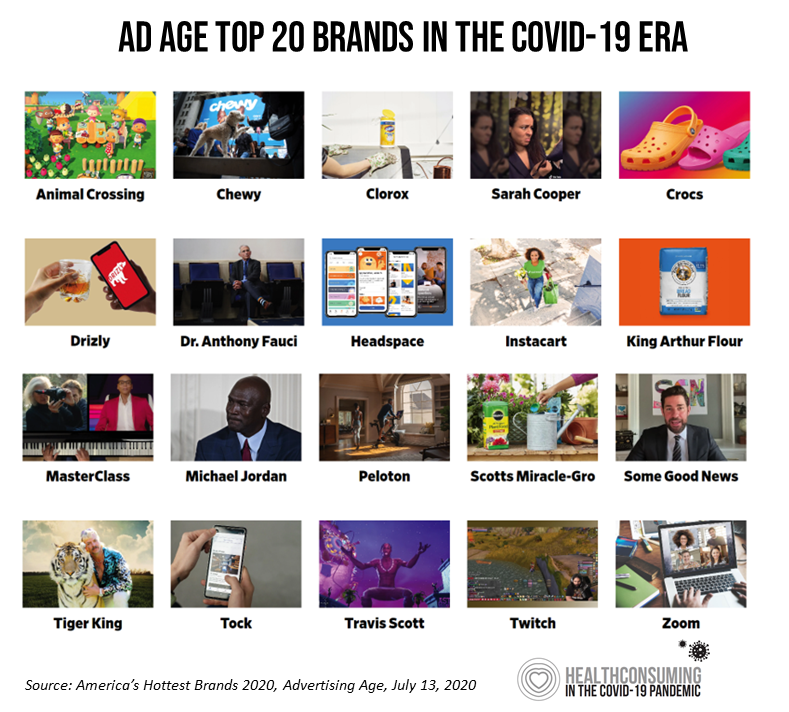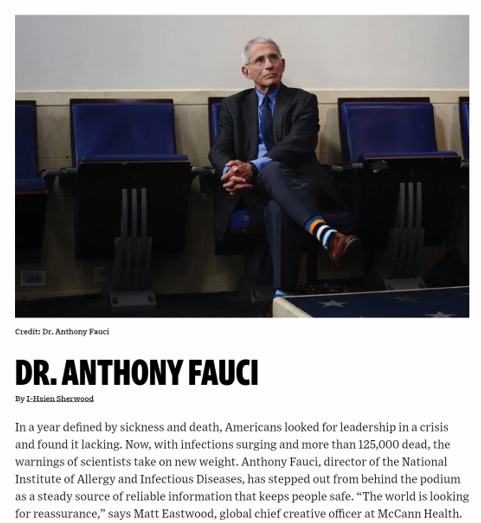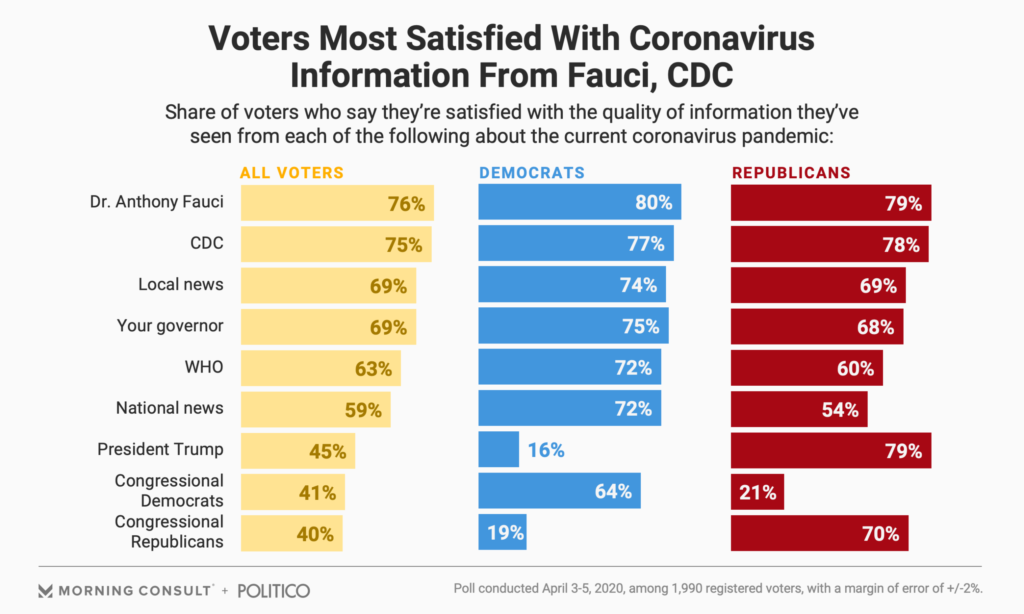Advertising Age announced their list of the top 20 brands in 2020 this week. Ad Age’s lens on these was heavily tinted by consumers’ lives coping with the coronavirus pandemic: “The coronavirus has brought new attention to typically boring, decades-old consumer staples, while hastening the rise of digital newcomers that were only just beginning to gain traction pre-pandemic,” Ad Age explains in the introduction to the list of the selected brands.
As the editors of the MadMen-and-Women’s most influential industry publication, they explain, “Ad Age chronicles 20 brands that are having a moment.”
This moment to them as well as to me, is heavily baked with health and wellness on consumers’ minds.
 Among the brands that directly play into health and wellness are Dr. Fauci (yes, he’s a brand and the most-trusted voice on coronavirus science in the U.S.; Headspace, the fast-growing mobile health app focused on mental health, which I’ve described as the pandemic that will last long after “the” pandemic; and, Peloton, the connected fitness cycle. One other is being well-used by the health care community: Zoom, which has played a huge role in convening health care meetings and conferences as well as been stood up as a key channel for direct-to-consumer telehealth, unbranded as a telemedicine brand but crucial connective tissue linking doctors and patients during the COVID-19 crisis.
Among the brands that directly play into health and wellness are Dr. Fauci (yes, he’s a brand and the most-trusted voice on coronavirus science in the U.S.; Headspace, the fast-growing mobile health app focused on mental health, which I’ve described as the pandemic that will last long after “the” pandemic; and, Peloton, the connected fitness cycle. One other is being well-used by the health care community: Zoom, which has played a huge role in convening health care meetings and conferences as well as been stood up as a key channel for direct-to-consumer telehealth, unbranded as a telemedicine brand but crucial connective tissue linking doctors and patients during the COVID-19 crisis.
Arguably, other brands among the 20 foster health and wellness at home: Animal Crossing, the video game, has helped people pass the time and be entertained inside at home during our shelter-in-place orders. The New York Times said Animal Crossing was, “the game for the coronavirus moment.”
Instacart, of course, has helped us with food delivery to the home as we’ve physically distance and continue to be concerned about exposure to the virus in retail settings.
MasterClass has helped us learn new skills at home, from baking to meditating. This speaks to other brands on the list: King Arthur Flour (for baking, also teaching like a master class for pastry and pie-making through its Bakers Hotline); and, Headspace covers the mindfulness front.
Then there’s Chewy, the ecommerce platform for our pets, some of whom have been adopted in the pandemic to keep us company and give us higher purpose. Walking a dog has many health benefits, we know from lots of research.
And Scotts Miracle-Gro is a trusted brand we can count on for gardening, which is great for getting out of the house, physical activity, and many health benefits Mother Earth affords us. (There’s medical evidence for gardening and spending time in green spaces).
 Ad Age discusses each of the 20 brands on the website, with details about the editors’ rationale for including each brand in this list of 20.
Ad Age discusses each of the 20 brands on the website, with details about the editors’ rationale for including each brand in this list of 20.
Here’s their snipped about Dr. Fauci:
“In a year defined by sickness and death, Americans looked for leadership in a crisis and found it lacking. Now, with infections surging and more than 125,000 dead, the warnings of scientists take on new weight. Anthony Fauci, director of the National Institute of Allergy and Infectious Diseases, has stepped out from behind the podium as a steady source of reliable information that keeps people safe.
“’The world is looking for reassurance,’ says Matt Eastwood, global chief creative officer at McCann Health. ‘His empathetic, authentic leadership paired with data and evidence-based information is what has led to Dr. Fauci becoming a rockstar of care and a trusted voice for Americans looking for security in an uncertain world.’
“In a true sign of celebrity, the doctor even has his own bobblehead doll, from the National Bobblehead Hall of Fame and Museum in Milwaukee, Wisconsin. At first reticent to contradict political leaders, Fauci has been recently breaking ranks to correct misinformation and present a potential road map to combating the coronavirus. Whether the public and the government listen is another matter.”
Health Populi’s Hot Points: Even before the coronavirus pandemic, patients in the U.S. were growing their health consumer muscles, motivated by taking on high-deductible health plans and greater out-of-pocket medical costs, looking to stay well and outside of medical care if possible, and Marie Kondo’ing our lives to be more organized and less stressed.
COVID-19 accelerated trends already in place by early 2020. The process of staying home, making hygiene and sourdough bread in place, and learning about epidemiology and “flattening the curve” through daily newscasts, has morphed people into health consumers. People have sought health engagement across the many industries that touch their lives, well beyond healthcare, pharma, and health insurance.
 All health is retail now in the high-deductible era, and will be moreso beyond the pandemic. In the U.S., COVID-19 has shown people that health can often be made and bolstered at home — through virtual visits on telehealth platforms, using mobile tools for mental health and mindfulness, walking our dogs, cleaning house, and listening to evidence-based scientists for the best health information.
All health is retail now in the high-deductible era, and will be moreso beyond the pandemic. In the U.S., COVID-19 has shown people that health can often be made and bolstered at home — through virtual visits on telehealth platforms, using mobile tools for mental health and mindfulness, walking our dogs, cleaning house, and listening to evidence-based scientists for the best health information.
Dr. Fauci, stay strong. Your brand certainly is. By April 8, 2020, Dr. Fauci was the most trusted source of coronavirus information among U.S. voters in America.
